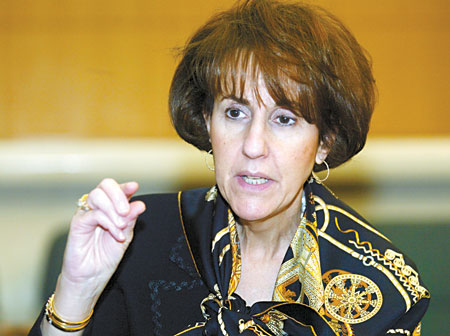|

Charlene Barshefsky [China Daily]

|
One of the architects of
China's World Trade Organization (WTO) Agreement in 2001 said she believes the
country must play a bigger role in international trade body.
"I'm very happy and impressed with the progress China has made in the past
five years. I think China has pursued implementation (of its WTO commitment)
reasonably well," former US Trade Representative Charlene Barshefsky told China
Daily.
"Now, China should be a manager of the WTO instead of merely a part of it,"
she said.
In 1999, when the US-China WTO agreements were concluded, China's foreign
trade volume stood at US$360 billion, a figure that will approach US$1.7
trillion this year. In 1999 China accounted for about 4 per cent of world trade,
but today that share is about 10 per cent.
In terms of implementation, Barshefsky said China had made its biggest
strides in tariff reduction, quota reduction and elimination, and in the
drafting of related legislation and its transparency.
But questions concerning the protection of intellectual property rights,
services trade, banking regulations and new regulations on investment should be
further addressed, she said.
Barshefsky also called for a stronger role for China to help bring an end to
the Doha round of talks, which have stalled for five years.
"As a member and manager of the WTO, China has responsibility in ensuring the
WTO's success. And as the single biggest country reliant on exports to grow,
China does have a very big stake in ensuring that it assists managing the
negotiating process," she said.
China could also consider either accelerating opening in certain areas, or it
could indicate that it will move fully forward on services liberalization to
help promote the Doha round, she said.
Barshefsky also suggested that China should play a role in attempts to take
some Arab countries into the WTO to ease the tensions in the Middle East.
"A very good start might be an agreement among the US, Europe, China, Japan
and perhaps Brazil and India to provide a special trade treatment for Middle
East economies that are willing to reform, and allowing goods from these
countries to enter the countries above-mentioned duty free," she said.
As many Chinese companies are seeking to invest in the Untied States,
Barshefsky reminded that these enterprises must look at the entire range of US
laws and make sure that they have touched all of the appropriate basses in
Washington and elsewhere to avoid problems.
| 1 | 2 |  |